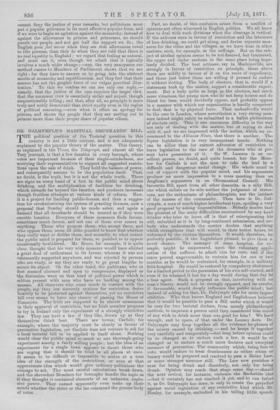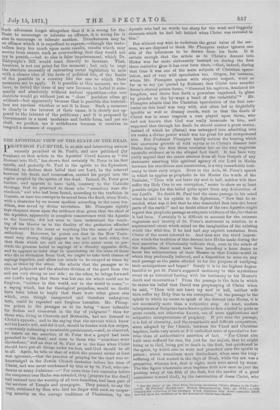DR. DALRYMPLE'S HABITUAL DRUNK A.RDS' BILL.
THE political position of the Teetotal question in this country is not a little curious, and is not adequately explained by the popular theory of the matter. This theory, as explained in the Times, the Telegraph, and almost all the Tory journals, is that a few fanatics in every borough, whose votes are important because of their single-mindedness, are worrying their representatives to support all suggested restric- tions upon the sale of drink. They hold the balance of power, and consequently assume to be the population itself. That, no doubt, is the truth, but it is not the whole truth. There are signs on every hand of a fret in the public mind about drinking, and the multiplication of facilities for drinking, which extends far beyond the fanatics, and produces incessant though fruitless attempts at various kinds of reform. Now, it is a project for limiting public-houses, and then a sugges- tion for revolutionizing the system of granting licences, now a proposal that Sunday should be made sober, and again a demand that all drunkards should be treated as if they were curable lunatics. Everyone of these measures finds favour, sometimes much favour, and not one of them ever comes to anything. Those who propose them, who accept them, and who oppose them, seem all alike puzzled to know first whether they really want or dislike them, and secondly, to what extent the public mind is prepared for them, so puzzled as to appear occasionally bewildered. Mr. Bruce, for example, it is quite clear, thought that his very wide measure would have elicited a great deal of enthusiasm in its favour, whereas it was not vehemently supported anywhere, and was rejected by persons who are ready, or say they are ready, to go great lengths to secure its object. On the other hand, the publicans, who at first seemed alarmed and open to compromise, displayed as the discussion went on that kind of political power which is seldom present with men who have no backing among the masses. All observers who come much in contact with the people, say they are sincerely anxious for restriction, desire heartily to be protected against themselves, yet no restrictive bill over seems to have any chance of passing the House of Commons. The Irish are supposed to be almost unanimous in their approval of restriction, but no Irish member proposes to try in Ireland only the experiment of a strongly restrictive law. They can have a law, if they like, drawn up as they
themselves think best. There are towns, Carlisle, for example, where the majority must be clearly in favour of preventive legislation, yet Carlisle does not venture to ask for a local teetotal bill to be applied to itself alone. Nothing would clear the public mind so much as one thorough-going experiment among a fairly willing people ; but the idea of an experiment for a single town appears to daunt those who are urging that it should be tried in all places at once. It seems to be difficult or impossible to arrive at a true idea of the strength of the restrictives, or even at that approximate idea which would give ordinary politicians the courage to act. Tho most careful calculations break down, and the shrewdest Members for boroughs handle the topic as if they thought it contained elements of an unknown explo- sive power. They cannot apparently even make up their minds whether the strict or the lax command the greater body of votes.
Part, no doubt, of this confusion arises from a conflict of opinions not often witnessed in English politics. We all know ' how to deal with such divisions when the cleavage is vertical. If the artizans were in favour of restriction and the labourers of free drinking, we could get along, and devise separate mea- sures for the cities and the villages, as we have done in other matters, such, for example, as the suffrage. But on the sub- ject of alcohol opinion seems to be not fissured, but laminated, the upper and under sections in the same place being hope- lessly divided. The best artizans, say in Machineville, are strongly in favour of restriction on principle, those above them are mildly in favour of it on the score of expediency, and those just below them are willing if pressed to endure it without rioting. The body of electors, that is, would if a statesman took up the matter, support a considerable experi- ment. But a body quite as large as the electors, and much more vivacious, the young men who do not keep houses and do thirst for beer, would decidedly oppose, and probably oppose in a manner with which our organization is hardly competent to deal, that is by physical force. That undoubtedly would be the case in London, where nevertheless a very strong mea- sure indeed might safely be submitted to a ballot plebiscitum of electors only. This is one enormous difficulty in the way not only of dealing with the matter, but of trying to deal with it, and we are impressed with the notion, which we re- commend to the Alliance News, that there is another. The liquor legislation is in very incompetent hands. Nothing can be sillier than for earnest advocates of restriction to leave legislation to the care of the dreamers who at pre- sent have possession of it. Sir W. Lawson is an ex- cellent person, no doubt, and quite honest, but the Mem- ber for Carlisle is not the man to take the lead in a difficult and dangerous social change. His whole mind is out of rapport with the popular mind, and his arguments produce no more impression in a mass meeting than an Anglican's arguments in an (Ecumenical Council. His favourite Bill, apart from all other demerits, is a silly Bill, one which enlists on its side neither the judgment of states- men, nor the enthusiasm of philanthropists, nor the instinct of the masses of the community. Then here is Dr. Dal- rymple, a man of much higher intellectual type, spoiling a very good proposal by asking impossibilities. Nobody doubts that the greatest of the many difficulties encountered by any hard drinker who tries to leave off is that of reinvigorating his will, enfeebled as it is by long-continued submission, and no- body who understands the matter doubts that anything which strengthens that will would, in their better hours, ho welcomed by the victims themselves. It would, therefore, be perfectly possible, if the Legislature pleased, to give them a novel chance. The manager of some hospital, for ex- ample, might be empowered, upon the voluntary appli- cation of the sufferer, to admit him for cure, and if the crave proved ungovernable, to restrain him for one or two months, as he would be restrained, for example, in a military field-hospital. He would be restored by compulsory abstinence for a limited period to the possession of his own self• control, and even if he retained it but for a day would during that day be a free agent. Such a proposal as that, interfering with no man's liberty, would not be strongly opposed, and its results, if favourable, would deeply influence the public mind ; but instead of asking for that, Dr. Dalrymple asks for mere impos- sibilities. Who that knows England and Englishmen believes that it would be possible to pass a Bill under which it would be easy for two teetotal doctors, from merely philanthropic motives, to imprison a person until they considered him cured of any wish to drink more than was good for him ? We have enough, and to spare, of that under the Lunacy Acts. Dr. Dalrymple may heap together all the evidence he pleases of the misery caused by drinking, —and he heaps it together very carefully and temperately—but long before opinion could be so changed as to endure such a law, it would be so changed as to endure a much more decisive and sweeping measure of prevention. The community which, being free to vote, would endure to treat drunkenness as either crime or lunacy would be prepared and resolved to pass a Maine Law, or some stronger measure still. The Law now punishes a man for being drunk and disorderly, not only for being drunk. Opinion may reach that stage some day — should the next revival, for instance, embrace the Rechabite ides —but it certainly has not reached it yet, and to run before it, as Dr. Dalrymple has done, is only to create the prejudice against social legislation of any restrictive kind which Mr. Henley, for example, embodied in his telling little speech. Such advocates forget altogether that if it is wrong for the State to encourage or tolerate an offence, it is wrong for it also to encourage or tolerate another. Drunkenness may be an offence which it is expedient to repress,—though the teeto- tallers harp too much upon mere results, results which may accrue from causes, such as overworking, that they would not try to punish,—but so also is false imprisonment, which Dr. Dalrynsple's Bill would tend directly to increase. That, however, is not our point for the moment ; but only to urge the absolute necessity of entrusting social legislation to men with a clearer idea of the facts of political life, of the limits of the possible in a country like the one to which their measures are to apply. It is possible at this moment, we be- lieve, to forbid the issue of any new licences, to forbid it sum- marily and absolutely without serious opposition—for new districts would go without just as " close " parishes often go without—but apparently because that is possible the teetotal- lers are careless whether or not it is done. Such a measure is clearly in the interest of their cause, it is clearly not op- posed to the interest of the publicans ; and it is proposed by Government in a most moderate and feeble form, and yet we shall, we predict, see it withdrawn because it receives so languid a measure of support.































 Previous page
Previous page